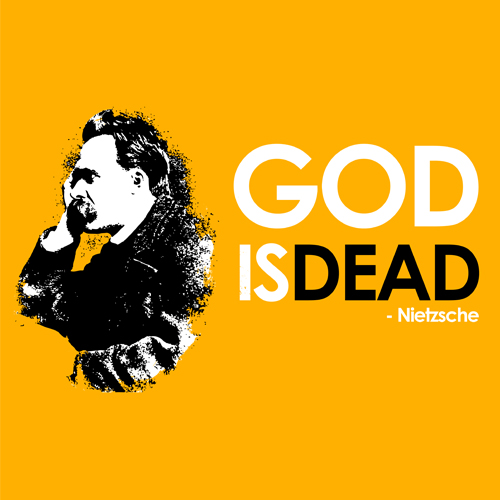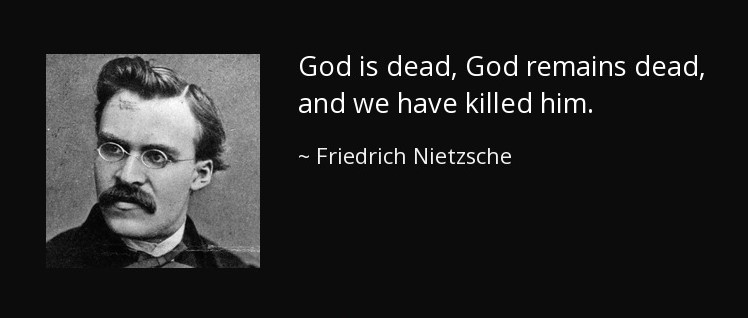What does it mean?

What Nietzsche did not mean.
The phrase “God is dead” is one of the most famous and most misunderstood statements by the German philosopher Friedrich Nietzsche.
He didn't mean:
1. God is literally dead or doesn't exist
2. Chrisianity is dead and finished
3. Atheism wins
4. God is irrelevant
Does the longer quote change the meaning?

What he meant.
People often misread “God is dead” as literal, celebratory, dismissive, or personal.
But he meant it as a cultural diagnosis:
Western society had “killed” its own belief in God,
and now had to face the (possibly) terrible consequences.
What is nihilism?
What is Nihilism?
What is Nihilism?
2. PURPOSE (what do I do?)
3. VALUE (why do I matter?)
It suggests that traditional morals, beliefs and institutions are unfounded and that
there is no objective basis for truth or ethics.
Problems and solutions of Nihilsm
What problems might this world view cause?
What does the Bible say?


Ecclesiastes
Life without God is Nihilistic
1.1-2: The words of the Teacher, “Meaningless! Meaningless!” says the Teacher.
“Utterly meaningless! Everything is meaningless.”
God is not dead so we have a purpose.
12.13: When all has been heard, the conclusion of the matter is this: Fear God and keep His commandments, because this is the whole duty of man.
Why keep God's commands?
12.14: For God will bring every deed into judgment, along with every hidden thing,
whether good or evil.
Nihilism vs the Bible


Nihilism vs the Bible
Nihilism says: “Why study? None of it matters in the end.”
Bible says: “Learning and using your gifts honours God and serves others.”
Nihilism says: “Why be kind? People are just accidents of nature.”
Bible says: “Each person is made in God’s image, so treat others with dignity.”
Nihilism says: “Life has no purpose; just distract yourself.”
Bible says: “God has a wonderful eternal purpose and plan for your life.”
The phrase “God is dead” is one of the most famous and most misunderstood statements by the German philosopher Friedrich Nietzsche. It appears in several of his works, most notably The Gay Science (1882) and later in Thus Spoke Zarathustra (1883–85).
The Full Quote (from The Gay Science, §125, “The Madman”):
“God is dead. God remains dead. And we have killed him. How shall we comfort ourselves, the murderers of all murderers? The holiest and the mightiest that the world has hitherto possessed has bled to death under our knives: who will wipe this blood off us? What water is there to clean ourselves? What festivals of atonement, what sacred games shall we have to invent? Is not the greatness of this deed too great for us? Must we not ourselves become gods simply to appear worthy of it?”
Meaning:
Nietzsche was not celebrating the death of God, nor did he literally mean God had died. Instead, he was describing the cultural shift in 19th-century Europe, where belief in God and traditional Christianity was rapidly declining due to science, philosophy, and secularisation.
“God is dead” = The old religious framework that gave people meaning, morality, and certainty no longer held power.
Nietzsche saw this as both a crisis and an opportunity:
Crisis → Without God, many people could fall into nihilism (the belief that life is meaningless).
Opportunity → Humanity now had the chance to create new values and redefine purpose without relying on divine authority.
✅ In short:
“God is dead” is Nietzsche’s way of saying that modern society can no longer rely on traditional religion to provide meaning—humans must now create their own.
Would you like me to also explain how this connects to nihilism and Nietzsche’s idea of the Übermensch (Overman), since that’s the “next step” he proposes after this quote?
The Bible doesn’t use the word nihilism (that came much later, from 19th-century philosophy), but it does address the core idea of nihilism—that life has no meaning, purpose, or ultimate value. In Scripture, we can see this theme answered in several ways:
1. Ecclesiastes wrestles with “life is meaningless”
Ecclesiastes begins with the famous line: “Meaningless, meaningless, says the Teacher, utterly meaningless! Everything is meaningless.” (Eccl. 1:2, NIV).
This sounds very close to nihilism—it recognises the futility of life without God.
But by the end, the Teacher concludes: “Fear God and keep his commandments, for this is the duty of all mankind.” (Eccl. 12:13).
➡️ So while life apart from God feels meaningless, with God it gains ultimate meaning and purpose.
2. God gives life purpose and value
Nihilism claims human life is insignificant. But the Bible says humans are made in the image of God (Genesis 1:27), giving every person dignity and worth.
Isaiah 43:7 says God created people “for my glory”—meaning life has direction: to reflect and honour Him.
3. Hope beyond death
Nihilism often says: “When we die, that’s it, so nothing matters.”
The Bible answers with resurrection hope: “If the dead are not raised, ‘Let us eat and drink, for tomorrow we die.’ But Christ has indeed been raised from the dead.” (1 Corinthians 15:32, 20).
The resurrection means life has eternal significance, not just temporary pleasures.
4. Christ as the answer to despair
In John 14:6 Jesus says: “I am the way, the truth, and the life.”
Colossians 1:16 adds: “All things were created through him and for him.”
➡️ Meaning is not something humans must invent (as Nietzsche suggested), but something received from God through Christ.
✅ Summary:
The Bible acknowledges the despair that nihilism names—especially in books like Ecclesiastes—but answers it by pointing to God as the source of meaning, human dignity, and eternal hope through Jesus.
🔹 Practical Applications of Nihilism
If someone embraces a nihilistic worldview (life has no ultimate meaning or values), it often leads to:
Living only for the moment – “If nothing matters, I may as well just chase pleasure or avoid pain.”
Detachment or apathy – “Why care about justice, morality, or helping others if nothing really counts?”
Self-defined truth – People make up their own values, but these can shift with moods or culture.
Despair and hopelessness – If life is just random chance with no bigger story, some may feel empty, anxious, or even depressed.
🔹 Practical Applications of the Biblical View
The Bible answers each of those points by grounding meaning in God:
Purposeful living – “So whether you eat or drink or whatever you do, do it all for the glory of God.” (1 Cor. 10:31). Everyday life—study, friendships, sport, family—has purpose when done for God.
Active love – Instead of apathy, the Bible calls us to “love your neighbour as yourself” (Mark 12:31). Meaning is found in service and relationship.
Stable truth – God’s Word provides an anchor, not shifting opinions: “Your word is a lamp to my feet and a light to my path.” (Ps. 119:105).
Hope beyond death – Instead of despair, Christians live with hope: “We have this hope as an anchor for the soul, firm and secure.” (Heb. 6:19).
🔹 In Everyday Life for Students
Nihilism says: “Why study? None of it matters in the end.”
Bible says: “Learning and using your gifts honours God and serves others.”Nihilism says: “Why be kind? People are just accidents of nature.”
Bible says: “Each person is made in God’s image, so treat others with dignity.”Nihilism says: “Life has no purpose; just distract yourself.”
Bible says: “God has a plan for your life” (Jeremiah 29:11).
✅ Summary: Nihilism leads to emptiness, but the Bible gives a foundation for purposeful living, compassion, truth, and hope.




